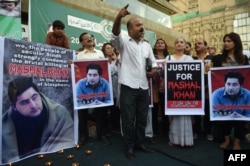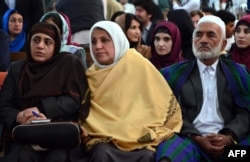A student in Pakistan stabbed his professor to death earlier this week after accusing him of committing blasphemy and promoting un-Islamic culture at a college in southern Punjab’s Bahawalpur city, according to law enforcement officials.
The student, Khateeb Hussain, attacked his English professor, Khalid Hameed, with a knife Wednesday at Government Sadiq Egerton College.
The attacker was apparently unhappy about plans for an upcoming farewell party the professor was arranging that would include both male and female students of the college.
The attacker allegedly viewed the party as vulgar and against the teachings of Islam.
In a video recorded of the attacker after the incident, which went viral on the internet in Pakistan, Hussain can be heard bragging about his crime and saying he has no remorse whatsoever for his action.
“He (the professor) used to bark a lot against Islam. He would say a lot of things against Islam every day. It is good that he is now dead. I’m content and thanks to Allah that the professor is dead now,” Hussain says on the video.
Law enforcement officials say the student has been taken into custody and charged with murder. Officials say their initial inquiries found no evidence that the suspect has affiliation with any religious or militant group.
Growing radicalization
The case has generated widespread condemnation across the South Asian country, where growing radicalization among youth and intolerance toward people of other religions has many concerned about the long-term consequences of the trend.
Some rights activists say that extremism among youth has become so prevalent that many don’t hesitate to take matters into their own hands and to kill anyone over unproven allegations of blasphemy or acts deemed anti-Islamic.
“It is about the mindset. How can a student gather the courage to come and stab a teacher in the college premises and have no remorse of the act?” Mehdi Hassan, a Lahore-based human rights activist, told VOA.
“This is not the first incident of this kind and yet another proof of educated youths’ inclination towards extremism. The government must take strict actions against such elements so that no one else would have the courage to do it ever again,” Hassan added.
Rasul Baksh Raees, an analyst and education activist, echoes Hassan’s concerns and charges that strict enforcement of the law and engagement of youth in crucial conversations about issues considered taboo in the country is an absolute necessity.
“Outdated teaching methods, ignorance and lack of dialogue on the matter is promoting radicalization among youth,” Raees told VOA.
“The nation needs to develop a system where the youth is allowed to ask questions in mind regarding Islam. That might help these educated youth to stay away from acts that are totally against the religion, such as murdering someone in the name of religion,” he added.
Blasphemy
Blasphemy remains a sensitive topic in predominantly Sunni Muslim Pakistan, where insulting Islam’s prophet or the religion is punishable by death. Mere accusations in the past have resulted in mob violence and lynchings of alleged blasphemers.
Rights activists have long complained about the misuse of blasphemy laws in the country, where many people have been murdered over unproven allegations of committing blasphemy or anti-Islam acts in recent years.
Last year, a student shot and killed his college principal on campus after accusing him of blasphemy in Charsadda city of Khyber Pakhtunkhwa province. The principal had scolded the student for missing classes to attend a protest organized by a right-wing Islamist group in Islamabad.
In April 2017, Mashal Khan, a student, was beaten to death by his fellow students at his university campus in the Mardan region of Khyber Pakhtunkhwa province. Khan was accused of posting blasphemous materials on social media.







